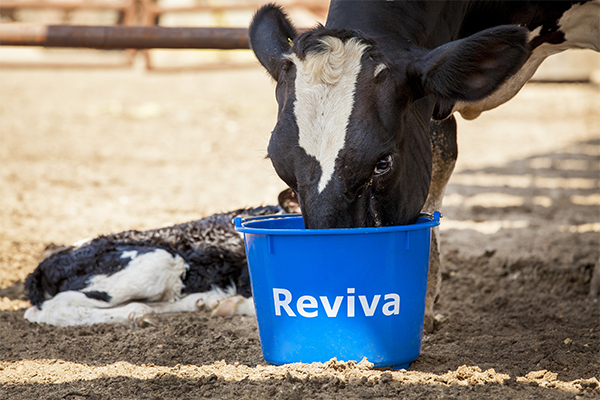A cow drink after calving: small effort, big effect!
- Ruminants
(Subclinical) milk fever is still too common in Scandinavia: about 30% of cows experience the disease around calving. The consequences can be significant. Besides reduced feed intake and the risk of uterus infections, milk production stays behind, there is a risk of culling and fertility problems may also occur in the long term. A lot of misery that is easily prevented. With one kg of cow drink, your dairy cow will be back to her old self in no time!

Calcium requirement increases enormously after calving
As a dairy farmer, you know that a cow experiences discomfort and calcium deficiency just after calving. Whereas a dry cow should have as little calcium as possible and sufficient magnesium, the calcium requirement increases enormously after calving. Available calcium disappears through colostrum and milk production in the colostrum and milk, leaving insufficient calcium for the cow herself. Due to the lack of calcium in the blood, milk fever can occur; often within 48 hours after calving. In addition, a more severe negative energy balance due to reduced feed intakes can cause health problems or make them worse.
Rapid return on investment
One of the most important preventive measures against milk fever is making calcium available at the right time and in the right way. Yet there is still a large group of dairy farmers who do not apply any intervention around calving. A missed opportunity! For business and animal welfare reasons, a cow deserves all the attention and energy it needs to recover quickly after calving. Especially considering that such an intervention is a small effort that pays for itself very quickly. A simple calculation: the costs due to milk fever are on average € 250 to € 600 per cow per lactation, whilst for only € 10 per cow you are spared a lot of problems.
Intravenous therapy, bolus or cow drink?
There are three ways to administer extra calcium to your cow: intravenous via an infusion, a bolus or a cow drink. The disadvantage of an infusion and bolus is that the calcium enters the bloodstream immediately, causing a sudden calcium spike. Although this allows the cow to recover quickly, the calcium wears off after only a few hours. In many cases, calcium levels even drop below pre-calving levels! A second or even third bolus or infusion is necessary in such a case. Moreover, administration of a bolus or an infusion is manually forced and not voluntarily absorbed by the cow. This releases stress hormones, which in turn affects the animal's resistance.
Calcium levels continue to rise with cow drink Reviva
To avoid stress around calving, it is recommended that a cow voluntarily takes up calcium. This can easily be achieved with Farm-O-San Reviva. Research shows that 96% of cows consume this tasty cow drink fully voluntary. After calving, Reviva immediately increases calcium levels, supporting a good lactation start, milk production and health. Unlike a bolus or infusion, Reviva provides the cow with calcium for a longer period. Indeed, after dispensing Reviva, calcium levels continue to rise from the time of calving, whereas when using a bolus, calcium levels show a dip within 24 hours of calving (Figure 1).

Preventing abomasal displacement
Cow drink Reviva offers more benefits. Immediately after birth, a cow loses a lot of fluid and about 45 kg of body weight. To prevent displacement of the abomasum, it is important to quickly replenish the rumen with water and feed. Reviva provides lightning-fast hydration and delivers plenty of energy, vitamins and minerals that support the cow's recovery and boost dry matter intake (Figure 2). What dextrose does for elite athletes, this orange energy boost does for the cow: she becomes active faster, stands up and uses her muscles earlier, which helps the afterbirth come off better. This can significantly reduce the risk of uterus infections and fertility problems.
